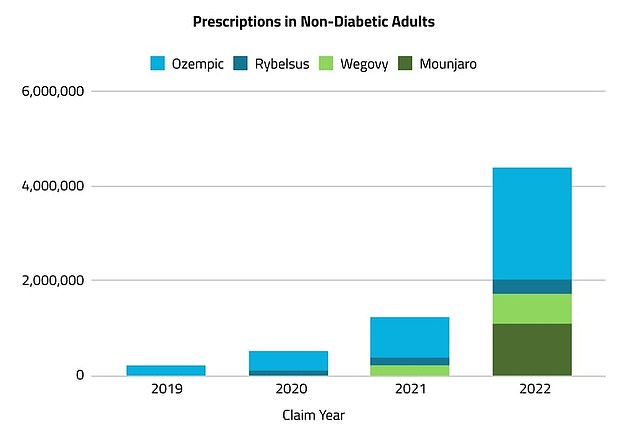Eli Lilly – maker of hit weight loss drugs – urges stars to stop taking them for ‘vanity reasons’ if they are not obese
The maker of blockbuster weight loss drugs has urged Hollywood stars to stop taking Ozempic and similar drugs due to shortages.
In a bizarre 30-second advert on television, Eli Lilly – which makes weight-loss drugs Mounjaro and Zepbound – urged those who are not fat to avoid the weight-loss drugs.
It said they had only been tested and approved for people who are overweight or obese – who are at higher risk of other conditions such as heart disease and cancer – or who have type 2 diabetes.
Blockbuster weight loss drugs — which cost about $950 a month out of pocket — have been in short supply for months due to rising demand. Estimates suggest that up to nine million prescriptions for the drugs were written in the last three months of 2022.
The ad urged people who want to lose just a few pounds not to get a prescription for weight-loss medications

Stars including Chelsea Hanlder, pictured above, have admitted to using the drugs
The TV ad – called ‘Big Night’ – begins by showing a sparkling dress being placed on a bed, a red carpet and paparazzi.
An overweight woman is then shown standing on the subway and holding her handbag.
A caption reads: “Some people have taken medications that were never intended for them. For the smaller dress or tuxedo. For a big night. For vanity.
‘But that’s not the point. People whose health is affected by obesity are the reason we are working on these medications.”
Company executives say they are running the ad to ensure their medicines get to those who really need them.
The ad will air on American channels just before the 96th Academy Awards, or Oscars, which will take place this Sunday in Hollywood, Los Angeles.
Last year, host Jimmy Kimmel joked about weight loss medications, saying, “As I look around this room, I wonder, is Ozempic right for me?”


Others who said they used weight-loss drugs include Elon Musk and Amy Schumer

In 2022, more than 5 million prescriptions for Ozempic, Mounjaro, Rybelsus or Wegovy were written for weight management, compared to just over 230,000 in 2019. According to market research agency Komodo Health, this represents an increase of more than 2,000 percent.
At the time, a slew of celebrities had revealed they were taking the drugs – which were still in short supply – to help them lose a few pounds.
They included comedian Chelsea Handler, who said she lost several pounds on Ozempic, and Elon Musk, who said he lost nearly 30 pounds while taking the drug, and model Remi Bader.
Celebrities who have revealed they have used Eli Lilly’s Mounjaro include Rosie O’Donnell, who said she was ‘very happy’ with the results.
Prescriptions for weight-loss medications in the US have increased by more than 2,000 percent since 2019 – compared to 230,000 prescriptions in 2019.
Analysts predict the weight loss drug market could reach $80 billion by 2030, up from about $3 billion in 2022.
In many cases, doctors have prescribed the drugs “off-label” to people who want to lose weight but who are not obese or have type 2 diabetes, fueling a deficiency.

The ad also showed someone laying out a dress on a bed, likely before an event

And there were hordes of photographers at the event
Currently, the Food and Drug Administration lists four out of five available doses of Wegovy — which is approved to help patients with weight loss — as in shortages.
It also lists three of the six available shots for Mounjaro, which is only approved for type 2 diabetics because there is a shortage.
The reason for these shortages is the demand for the medicine.
Eli Lilly CEO David Ricks shared CNN: ‘We have an opinion about how these medicines are used.
“These drugs were invented for people with serious health conditions; they weren’t invented to make a famous person look a little better.’
Ozempic and similar drugs have proven popular for their promise of helping people shed pounds with nothing more than a weekly injection.
Research found that patients taking the drugs lost 15 percent of their body weight, or about 30 pounds, over the course of 58 weeks.
But doctors are starting to warn that the drugs must be prescribed carefully and that if mismanaged, patients can regain their weight afterwards.
The drugs work by mimicking a hunger hormone in the body, making a person feel full even if they haven’t eaten recently.
But doctors warn that patients should continue to eat a high-protein diet to avoid losing more muscle than fat.
This can cause problems because if they then return to their old diet, they will gain back more weight than they lost because they now have less muscle mass.
